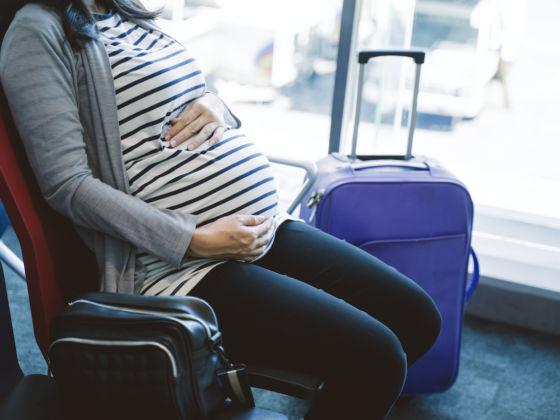When my husband and I started thinking about having a child, one of the first questions we asked ourselves was, “What country do we want to have our baby in?” As international teachers, it was important to us to time the pregnancy and delivery with being in a country where I felt comfortable giving birth. As I looked into some of our different options, I realized that there can be multiple benefits to giving birth abroad.

Giving Birth Abroad: Setting Up Your Child With a Second Citizenship
One reason to consider birth abroad, even if you live in your home country, is to set your child up with a second citizenship from birth. A number of countries, mostly in North, South and Central America, offer birthright citizenship, meaning that any baby born on that country’s soil automatically has a right to citizenship. This practice is known as jus soli, birthright by soil.
Depending on the country, a second citizenship and passport can give your child greater freedom to travel, less tax liability, access to more affordable health care or college education, and more employment and investment opportunities. A second citizenship will increase your child’s options, and although his or her adult future may seem a long way off, it can be well worth planning ahead.
Factors to Consider
If you are considering giving birth in a country other than your home country, here are some factors to research and think about.
1. Dual Citizenship Laws
Not all countries allow dual citizenship, and many countries only allow dual citizenship with a limited number of other countries. Find out about the dual citizenship regulations of your home country and the country you plan to have your baby in to make sure your child can hold both citizenships at the same time.
2. Tax Liability
Many countries do not tax income that is gained beyond its borders. The US is one country that does tax global income, making it more expensive in the long run to be a US citizen living outside the US than to be a non-resident citizen of another country.
3. Military Service Requirements
Some nations have an obligatory military service requirement for their citizens. Find out about these requirements as well as policies regarding involuntary drafting in times of war.
4. Security Regulations
Citizens of some countries may be subject to increased security regulations. For example, foreign nationals from Arab and Muslim countries were questioned and fingerprinted as part of the US “Special Registration Program” after 9/11. While Pakistan offers birthright citizenship, Pakistani nationals are often subject to stricter travel and immigration laws.
5. Cost of College Education
The cost of a college education differs widely between countries, and many public institutions offer lower rates (or free universal education) for citizens of their country or residents of a particular area. Find out if any of the countries offering jus soli have subsidized or low-cost educational opportunities.
6. Prenatal Care & Delivery Options
Whether you choose to give birth at home or abroad, it’s important to find out about your prenatal care and delivery options. A country’s citizenship may seem ideal, but if you are not comfortable with the medical facilities and birth practices in that country (or you can’t afford them) then you will want to look for a different option. Talk to other expats who have given birth abroad and find out about their experiences and recommendations.
7. Maternity & Paternity Leave
If you decide to give birth while working overseas, make sure you know what your company’s policies are regarding maternity and paternity leave. How long is the leave, and will you be paid during that time? Some countries have laws that require employers to grant a certain number of days to new mothers and fathers. The leave can be as short as 10 days or as long as several months depending on the country and your employer.
8. Birth Tourism Packages
In the US, a ‘birth tourism’ industry has been built up to cater to expectant mothers. Some hotels, like the Marmana Manhattan, offer package deals for moms-to-be that include things like airport transfers, two months’ accommodation, baby cradle and special gift packages.
Countries Offering Birthright Citizenship
The following list is from NumbersUSA, an immigration resource for US citizens. Countries may discontinue the practice of jus soli at any time, so it’s best to contact your nearest embassy or consulate for current policies before making any plans to give birth abroad.
North America: Canada, United States, Mexico
Caribbean: Antigua & Barbuda, Barbados, Dominica, Dominican Republic, Jamaica, St. Christopher & Nevis, St. Lucia, St. Vincent & the Grenadines, Trinidad and Tobago
Central & South America: Argentina, Belize, Bolivia, Brazil, Colombia, Ecuador, El Salvador, Grenada, Guatemala, Guyana, Honduras, Nicaragua, Panama, Paraguay, Peru, Uruguay, Venezuela
Asia: Azerbaijan, Pakistan
Africa: Lesotho
Pacific: Fiji
Final Decisions
In addition to the legal and medical factors, you will also want to consider more personal factors. If you have your baby abroad, will your family be able to visit you or be involved in your child’s early life? Will you be able to build a support network in your host country to help you during pregnancy and after the birth? If you plan on working after the birth, is quality childcare available?
Ultimately, we’ve decided to have our first child in the US as my husband is a dual Portuguese-American citizen and our child will already be born with two citizenships. For us, the personal factors, such as being closer to family able to spend more time with the baby because we’re currently back in school (and not working full-time teaching jobs), ended up being the deciding factors.
Community Connection
Have you ever had a child abroad or thought about giving birth abroad? Share your thoughts and experiences in the comments section.